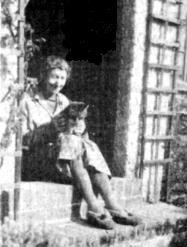Who is Emilie Crane writing to ?
When Emilie Crane penned almost 100 letters to her Canadian cousins during and after the Second World War from her cottage in Hastings, she had no way of knowing they would one day be transformed into a book.

The book, Letters from Lavender Cottage - Hastings in the Second World War and Austerity, is the documentation of Emilie Crane's experience in the Second World War. And, although she wrote the letters from her south-coast cottage, there is an interesting link to Croydon.
The book's author is now appealing for any living relations of Emilie Crane in Croydon, some of which are mentioned, to contact her with information about the woman she describes as a "remarkable nobody".
Victoria Seymour, who lives in Hastings, said: "Her nephew and extended family that lived in Croydon crop up towards the end of the book, and the end of her life when she's ailing in 1955.
"Some of them are mentioned in a letter as living in St Peter's Road, Croydon. It is believed they came to her aid when she became ill. Her memory must have gone down the family as 'batty old Aunt Emilie.
"She really was a remarkable nobody. She was kind-hearted, bright, cheerful, generous, optimistic - what more can you ask for in a person? Just a lovely old lady.
"She was an educated, career lady - an educational assistant secretary - who had lived through both world wars. She was born in 1871 and died in 1955.
"Any living relatives of Emily Crane still living in Croydon would. I'm sure, be delighted to know that she has practically become a celebrity through the letters she wrote to her cousins."
Victoria came across Emily's letters through a website she created about Hastings. A relative of Emilie Crane's Canadian cousin Marion had found the collections of letters after her death and was curious if Lavender Cottage still existed.
Victoria added: "I realised as soon as I saw them that I had a book. The content describes a very significant time in history seen through the eyes of an old lady. A lot of her letters talk about the shortage of food during the Second World War and her appreciation of the food parcels her Canadian cousins used to send to her.
"People might think it strange to talk about food so much, but during the years of harsh austerity the food rationing and shortage were often more severe than the conflict itself."
